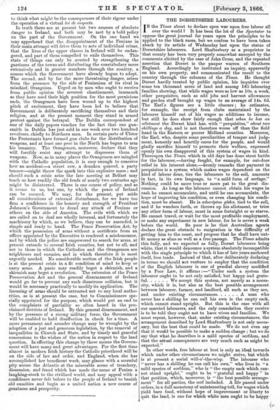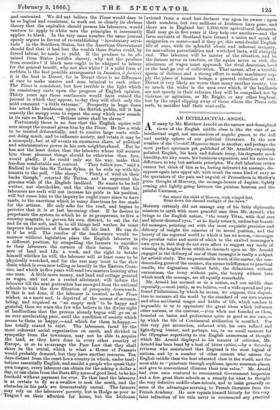THE DORSETSHIBE LABOURERS.
I S the Times about to declare open war upon free labour all over the world ? It has been the lot of the Spectator to oppose the great journal for years upon the principles to be applied to the black races, but we confess to have been taken aback by its article of Wednesday last upon the status of Dorsetshire labourers. Lord Shaftesbury as a proprietor in that county has been very properly somewhat annoyed by the comments elicited by the case of John Cross, and the repeated assertion that Dorset is the pauper warren of Southern England. Accordingly he instituted an inquiry, apparently on his own property, and communicated the result to the country through the columns of the Times. He thought Dorset hardly treated by public opinion, his inquiries over some ten thousand acres of land and among 185 labouring families showing, that while wages were as low as 10s. a week, other perquisites, such as odd jobs and harvest allowances and garden stuff brought up wages to an average of 14s. 6d. The Earl's figures are a little obscure ; he estimates, for example, the receipt from clubs maintained by the labourer himself out of his wages as additions to income, but still he does show fairly enough that when he has an allotment the Dorset hind has, with "perquisites," about two shillings a day, and is not therefore worse off than the field hand in the Eastern or poorer Midland counties. Moreover, the Earl, who, despite some peculiarities of temper and judg- ment, honestly and heartily cares for the people, and would gladly sacrifice himself to promote their welfare, expressed openly his own disapproval of this system of wages in kind. Thereupon the Times, which in old days has done stout battle for the labourer,—having fought, for example, for out-door relief in his interest alone,—keenly remarks that payment in perquisites is a system which makes wages dependent on the kind of labour done, ties the labourers to the soil, amounts in fact, in its own language, to "a mild form of serfage." Nothing could be more true or more pat to the great dis- cussion. As long as the labourer cannot obtain his wages in cash he cannot accumulate, and until he can accumulate, the hope of improving his condition, or even changing his condi- tion, must be absent. He is adscriptus glebce, tied to the soil, and if he wanders forth, or throws up his allotment, or tries any other form of labour, must in some fortnight or so starve. He cannot travel, or wait for the most profitable employment, or make any experiment in new labour, for he is never a week before the world. Bo poor is he that Australian agents declare the great obstacle to emigration is the difficulty of getting him to the coast, and propose that he shall have out- fit money as alms as well as a free passage. The Times admits this fully, and we expected as fully, Dorset labourers being whits, that it would denounce a system absolutely incompatible with the single principle to which it has of late years anchored itself, free trade. Instead of that, after deliberately declaring in terms we should not venture to employ that the condition of the English labourer is one of praedial slavery modified by a Poor Law, it affirms :—" Under such a system the labourer ought to be not only satisfied, but happy and grate- ful We accept this system, not merely as a neces- sity, which it is, but also as the best possible arrangement between labourer, farmer, and landlord, all such as they are, and under existing circumstances A man who never has a shilling he can call his own is the empty sack, which cannot stand upright. But this is the case with all our married labourers, and the only consolation they receive is to be told they ought not to have wives and families. We must repeat, however, that, under existing circumstances, the arrangement described by Lord Shaftesbury is not only neces- sary, but the best that could be made. We do not even say that it Wotild be possible to make a sudden change ; but we do say that what he describes is a mild species of serfdom, and that the aktual consequences are very much such as might be expected."
In other words, free labour at best is only an ideal towards which under other circumstances we might strive, but which is at present a social will-o'-the-wisp. The labourer who "never has a shilling he can call his own," who lives in "a mild species of serfdom," who is "the empty sack which can- not stand upright," ought to be "grateful and happy" in that position, which, moreover, is "the best possible arrange- ment" for all parties, the serf included. A life passed under orders, in a dull monotony of uninteresting toil, for wages which yield bare food, without hope of improvement or liberty to quit the land, is one for which white men ought to'be happy and oontented. We did net believe the Times would dare to be so logical and consistent, to work out so clearly its obvious theory that the capitalist should possess his labourers, would venture to apply to white men the principles it incessantly applies to black. In the very same number the same journal openly argues in favour of re-establishing "involuntary servi- tude" in the Southern States, lest the American Government should find that it had lost the wealth those States could, by forced labour, be made to yield. If the produce to be ob- tained from States justifies slavery, why not the produce from counties? if black men ought to be whipped to labour for the general benefit, why not also white if a mild form of serfdOm is the best possible arrangement in Jamaica, a fortiori it is the best in Dorset, for in Dorset there is no difference of race to make master and man inimical to each other. The Times is consistent, but how terrible is the light which its consistency casts upon the progress of English opinion. Thirty years ago those sentiments would have ruined the journal in which they appear, to-day they will elicit only the mild comment "a little extreme." Prosperity in huge doses has acted like laudanum Upon the British public, till it has scarcely the energy even to repeat the song which now sounds in its ears so Radical, "Britons mittr shall be slaves."
Fortunately there is no fear that the English squire will ever accept the counsel given him by the Times. He has a wish to be treated deferentially, and to receive large rents with- out doing much, and to influence society, and retain it may be a monopoly,. but at all events an enormous share, of political and administrative power in his own neighbourhood. But he has not the least desire that the labourer whose toil secures him these pleasant things should be otherwise than free, would gladly, if he could only see his way, make that freedom comfortable and content. "They follow you," said a Radical to the late Sir Tatton Sykes, as he rode up with his tenants to the poll, "like sheep." "Plenty of wool on their backs though, retorted Sir Tatton, and he expressed the genuine wish of the English landlord. He wants to be bell wether, not slaveholder, and the clear statement that his labourers are serfs will not increase his pride in his position, will but rouse him to the inquiry he ought years since to have made, to the exertions which in many directions he has made for the artisan. He only asks for the road, and begins to perceive that it is at last becoming clear. If he desires to perpetuate the system in which he is so prosperous, to live a country magnate, to govern his own district, to eat the fat and lie on the soft, and be in all things bell wether, he must improve the position of those who till his land. He can do it if he will. The resolve of the landowners would to- morrow without legislation place the English labourer in a different position, by compelling the farmers to sacrifice to their labourers the corners of their farms. With an acre of land and 12s. a week, and the right to betake himself whither he will, the labourer will at least cease to be physically wretched, and for the rest may trust to the slow drain which is even now telling so heavily in the Eastern Coun- ties, and which in five years will send two masters hunting after one man. A little more money, and land and cottage granted as wages, and not as a rented allotment, will induce the labourer till the next generation has emerged from the national schools to wait the slow filtration of prosperity downwards. If this is not done, if the labourer is treated, as the Times wishes, as a mere serf, is deprived of the means of accumu- lating, and required as "an empty sack" to be happy and grateful, then we warn the few who believe in the divine right of landlordism that the process already begun will go on at an ever accelerating pace, until the condition of society which seems to them so happy,—and which for them ituhappy,— has totally ceased to exist. The labourers, faced by the most coherent social organization on earth, and divided in sympathy from the townsmen, may not be able to acquire the land, as they have done in every other country of Europe, or so to re-arrange the Poor Law that they shall share in the rental, which is what a House of Peasants would probably demand, but they have another resource. Ten days distant from the coast lies a country in which, under insti- tutions essentially English, and amidst a people who speak their own tongue, every labourer can obtain for the asking a dollar a day, or can claim from the State fifty acres of good land, to be his freehold without payment for ever. To that land the labourer is as certain to fly as a swallow to seek the south, and the obstacles in his path are demonstrably unreal. The farmers may rely on the labourers' poverty, but is Hodge as poor as I Teague on their affection for home, but the Irishman evicted from a mud hut declares war upon its owner ; upon their numbers, but two millions of Irishmen have gone, and there are in England but 1,600,000 agricultural labourers. Half may go in five years if they help one another—and the farm servants of Scotland have formed a union and speak of emigration en masse--and if they go, this semi-feudal English life of ours, with its splendid ideals and inherent savagery, its marvellous potentialities and wretched facts, will abruptly end. The labourer will be master of the situation, and be the farmer never so resolute, or the squire never so rich, the minimum of wages must approach the rival American level or the land go out of cultivation. That means, after a terrible spasm of distress and a strong effort to make machinery sup- ply the place of human beings, a general reduction of rent. Dorset is very likely no worse than many another county, but so much the wider is the area over which, if the landlords are not speedy in their reforms, they will be compelled, not by violence, or agitation, or Mr. Bright, or any other bugbear, but by the rapid slipping away of those whom the Times calls serfs, to sacrifice half their rent-rolls.































 Previous page
Previous page